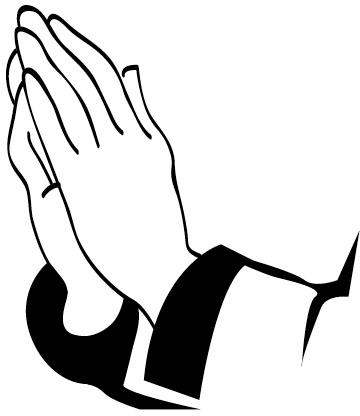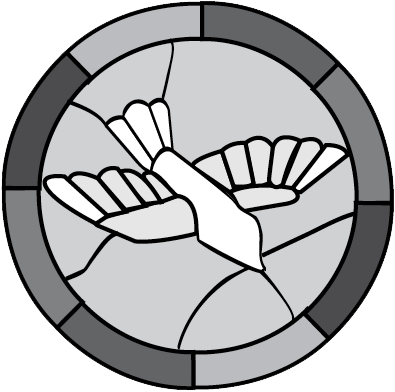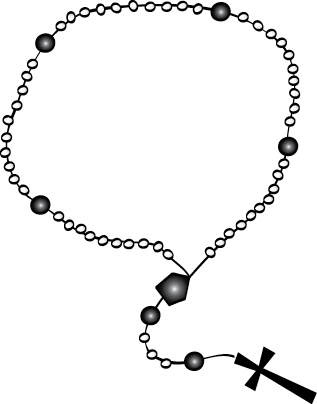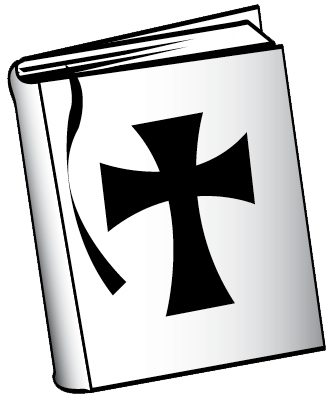Chapter
5
Opposing Forces
In This Chapter
![]() The Catholic interpretation of evolution
The Catholic interpretation of evolution
![]() Why evil exists in God’s own creation
Why evil exists in God’s own creation
![]() Understanding angels and their role in our world
Understanding angels and their role in our world
![]() Tracing man and woman back to the beginning
Tracing man and woman back to the beginning
![]() The fall of humanity through the original sin
The fall of humanity through the original sin
Now that we’ve covered the basic belief in God and the Trinity, we can move on to the rest of the first line of the creed. Yes, we’re still on the first line. You’ll be amazed by how much ground we’re going to cover with this one sentence. God has many attributes—we covered kind and merciful and steadfast in love in the previous chapter—but none of those are mentioned by name in the creeds. The only one of God’s qualities that is singled out for emphasis is “almighty,” as in “I believe in God, the Father almighty ….”
Well, that’s a big one, sort of all-encompassing, don’t you think? Being almighty means that God not only created everything out of nothing but also rules everything and can do anything and everything. (268)
The almightiness of God often leads humans to question a lot of things about their creator and about the world. What is an almighty God worth to us down here if he can’t make the world a perfect place? Ah, well, perfection may be the ultimate goal, but our world is a work in progress, and in imperfect places there are going to be imperfect realities—like evil and sin and sorrow. God wanted it to be perfect—a garden of paradise—but humanity got in the way, and humanity is still getting in the way.
How Did We End Up Here?
As we said at the beginning of the previous chapter on the creed, the first line of the Apostles’ Creed includes the words, “I believe in God, the Father almighty, creator of heaven and earth.” In the Nicene Creed, the words “of all that is seen and unseen” are added at the end of that line. So, what is the significance of these lines in the creeds and in the Catholic faith?
Catholics believe that God created everything, and they mean everything. The universe was not created by some random explosion or bang. They’re not saying there couldn’t have been a bang, but not a random bang. Nothing can be entirely random when God’s fingerprints are on the whole universal mix.
Before he ever created humankind, God began his plan for the salvation of humankind with the creation of the heavens and the earth, a plan that finds its ultimate completion in Jesus Christ. So out of his wisdom and love, God created the universe, including humankind, whom he made in his own image and invites to share in his being and goodness. (295)
What does this mean for those who side with science and the theory of evolution? Do these not conflict with the belief that God created everything out of nothing? Nope. Catholics can believe that humans evolved over time into the beings we are today. However, Catholics cannot believe that human evolution occurred devoid of divine inspiration.
When it comes to creation, there is no blind chance. You’ve seen it printed on tacky T-shirts, “God doesn’t make mistakes.” Well, that’s sort of the point here. God created everything that led to everything, and God makes humans unique by giving us souls.

You’re Absolved If …
You may think Catholics believe in the literal interpretation of the Genesis story of Adam and Eve. The Church does not teach the creation story as science, and it has no problem with the theory of evolution. Darwinism, however, presents a problem for the Catholic Church because it theorizes humankind’s evolution was caused by a random process and natural selection of the strongest and fittest, leaving the divine creator by the wayside.
Most of the time when we think of creation, we think of God the Father as the creator, but because the three persons of the Trinity cannot be divided in their work of creation and salvation (as we discussed at length in Chapter 4), it means that creation is the work of the Trinity as a whole. So the Son and Spirit are also responsible with the Father for all of creation. Once again, when it comes to the Catholic faith, there is a consistency and an interconnectedness that always brings you back around to the core beliefs.
Good, Bad, and Evil
If God is so good, why is evil so bad? There’s a loaded question if ever there was one. You know you’ve heard it. Maybe you’ve asked it. It’s hard to look at all the sorrow and tragedy and outright wickedness in the world and not wonder how God could possibly be so distracted that he’s missing all of this, or think he’s causing it or allowing it to happen. The Church teaches that he hasn’t missed, and isn’t missing, a thing, and he hasn’t caused, or isn’t causing, a thing when it comes to evil.
When bad things happen to good people, we can sometimes get to thinking that God is either good or powerful but not both. If he’s good but not powerful, then he’s a doddering old uncle. If he’s powerful but not good, then he’s no better than the gods of Greek tragedies. So where do Christians find the answer to the “problem” of evil? They find it in Jesus Christ, who did not come to fix the world’s problems but to live amidst all the world’s problems. Jesus came not only to suffer for us but to suffer with us.
Here’s how the Catechism explains the presence of evil in the world: God created humankind, and through something called “divine providence” tries to guide humans ever closer to the ultimate goal of perfection and eternity with him. But, and this is a significant “but,” God allows his creation to cooperate with him in this effort. How does this happen? Because God has given humanity free will, and although he hopes we will choose right and avoid wrong, he will not force our hands. (307)

Teachable Moment
The Catechism says God created a world that is “journeying” toward perfection, meaning that the world is not yet perfect. Physical good and physical evil must co-exist in an imperfect world. “In God’s plan this process of becoming involves the appearance of certain beings and the disappearance of others, the existence of the more perfect alongside the less perfect, both constructive and destructive forces of nature.” (310)
So God does not will evil; he permits evil out of respect for the freedom he has given all of his creation, and somehow, in ways we typically don’t understand until much later on, he finds ways to bring good from the bad. (311)
What Are Angels?
When Catholics profess that they believe in a God who is the creator of “all that is seen and unseen,” what exactly are they professing? The “seen” part is easy. Look around. But what about the “unseen” part? I’ll give you a clue: think wings.
Angels are the “unseen” creations. Mortals seem to be especially intrigued by the idea of angels, as evidenced by the little cherubic, winged statues that are so commonly found in flower gardens and any shop that sells crystals and incense. Angels are interesting, maybe because they are so mysterious.
What exactly is an angel? Often you hear people talk about how a dead relative is now an angel. Wrong. Catholics believe people who die do not become angels, but that angels are spiritual beings who never had bodies like us, and never will.
The Catechism goes back to St. Augustine for an explanation of angels. It turns out that “angel” is just a job description. The Greek word angelos means “messenger.” Angels, as we observe them in Scripture, are sent from God with a message for us. Think about the angel Gabriel announcing the Good News to Mary; think about the choirs of angels announcing the Good News of Jesus’ birth to the shepherds. We often use the word “spirit” to describe these ethereal attributes we observe or feel about beings we think of as angels.
Angels are free creatures, intelligent creatures, who are perfect in ways their earthly counterparts are not. “With their whole beings the angels are servants and messengers of God,” the Catechism explains. (329)
According to Catholic teaching, Christ is the center of the angelic world, which has existed since the beginning of the rest of creation and is central to the completion of the God’s divine plan. Angels are ever-present in the pivotal events of the journey toward salvation, from the Garden of Eden to the announcement that Mary would bear the Son of God to Jesus’ own death and resurrection. (332)

True Confessions
Satan is a “fallen” angel. Once on the side of God, who created him, he rejected God and became evil by his own doing. Satan is pure spirit, like all other angels. (391)
Oftentimes Catholics talk about their “guardian angels.” The Church teaches—and the Catechism quotes St. Basil the Great as saying—that every believer has an angel who serves as protector and guide throughout a person’s life from the beginning to end. (336)
Why Me?
Many of us wonder on a fairly regular basis why we’re here. We want to know our purpose, the point of our existence. That’s not easy to figure out because so much of it is beyond our human comprehension.
Things happen on our paths through life—sometimes terrible things—and yet somehow, years later, we often find a glimmer of good came out of the bad. Life is funny that way. It seems to have a mind of its own.
Bingo. It does have a mind of its own, and it’s the result of God’s will. God created order out of nothingness and gave us everything we see before us. Then he loved us into being. Each of God’s creations has within it a “particular goodness and perfection,” reflecting God’s goodness. (339)
Although human beings are the “summit” of God’s visible creation, we are expected to live in harmony with the rest of creation. Our rank in the hierarchy of creation does not give us the right to do anything that would destroy the order and balance that God gave to the universe. We are called to live in “solidarity” with the whole of creation. (344)
So humankind was created by God and in God’s image. But of all the creatures on earth, only humans have the capacity to know and love their creator—which sets us apart from the rest of creation. We are not somethings but someones, able to freely give ourselves to God if we so choose. (357)

You’re Absolved If …
You can see how you inherited many of your amazing qualities from your biological parents. While you may get your brown eyes or blond hair from your earthly mother or father, your soul comes directly from God. No genetics necessary there.
Human beings have the benefit of being both physical and spiritual, meaning that we get to enjoy both a body and a soul. The Catechism explains that it is because of our soul that our human bodies come to life. In other words, the body could not take living form without the soul. (365)
Our soul is the part of us that lives on after we die, and what will eventually be reunited with our bodies at the final resurrection at the end of all time, which we will discuss in further detail in Chapter 10.
Original Sin
So God gave us all these cool things—goodness, freedom, bodies, souls, and, at the outset, a nice little starter home in a neighborhood called paradise. He made man and woman with equal dignity to complement each other. He offered them friendship and the promise of eternal life. Who could ask for more?
Apparently humankind can always ask for more. Suddenly paradise started feeling a little cramped. The suburbs started looking better and better, and before you know it, Satan, in the form of a serpent, sold Eve a bill of goods and “original sin” was born. But before we get into the specifics of original sin, let’s talk about how humankind, if we are made in God’s image, is capable of sinning at all.
How Is Sin Possible?
Sin is here. There’s no getting around it. And it’s been here almost since the beginning of time. To some, what the Church calls sin might seem like nothing more than plain old human weakness or maybe just character flaws gone awry. But sin has to be viewed in relationship to God. The Church teaches that when we look at God’s plan and our place in that plan, then we are able to grasp that sin is a turning away from God’s plan and an abuse of the freedom he gave us. (387)
Let’s go back to the “fall” of Adam and Eve. They were given life and had every opportunity to do the right thing to honor God. But they wanted the one thing God said they couldn’t have: to be like God, but on their terms. So the very first humans disobeyed God, and the rest, as they say is history. Paradise, as God had originally created it, was no more. Eternal life was now a distant promise, and, for God knows how long, humanity wandered through the annals of history searching for a sliver of paradise lost and wondering when God would step in to save them.
Original sin, the Catechism says, is the “reverse side” of the Good News Jesus came to preach. Adam is the original sinner, and Jesus, the new Adam, is the one and only redeemer sent to fix what started with the fall in Eden. (389)
Whether or not you believe in a literal Adam and Eve, it is obvious there exists in our world a kind of evil that pulls humans away from good and pushes them toward a self-centeredness harmful to others, and ultimately themselves. Unfortunately, as the Church teaches, an actual Eden is not necessary for evil to come into existence in our world.

Teachable Moment
Catholics don’t believe in the literal interpretation of the Genesis story of Adam and Eve with magic trees and talking snakes. The Catechism explains belief in original sin as Genesis giving a figurative account of a “primeval event” that occurred at the beginning of humankind’s existence. Our first parents—regardless of what names they had—sinned. And their sin was bigger than them. Its roots were in the kind of evil that exists in opposition to God. So as a Catholic you don’t have to believe in Adam and Eve as specific historic persons, but you do have to believe in the original sin of humanity, a sin that leaves a mark on every human since the very first.
Satan’s Legacy
Satan, who represents all that is in opposition to God, is called the “father of lies.” He seduced humanity’s first parents, and countless generations since, into sin. Jesus, on the other hand, came to defeat Satan. (394) He conquered death and evil, proving that although Satan is powerful, he has his limits. Satan cannot stop God, no matter how much harm or destruction or mindless evil he causes on earth. God allows Satan to exist, but continues to help humanity push away the choice of evil and live by the wisdom and goodness of its creator. (395)

Church Speak
Concupiscence means that humankind is inclined to sin, even if we are baptized, because of the original sin we inherited from our first parents’ decision to reject God and choose evil. (1264)
So why is it Catholics believe that all people carry the burden of the first humans’ original sin? We weren’t there; we shouldn’t share the blame, right? This is how original sin works: Adam and Eve chose evil over good. “They wanted to be like gods,” and so they listened to the devil’s empty promises instead of God’s promises. Satan convinced them that disobedience would result in omnipotence. By eating from the Tree of Knowledge they would have powers that rivaled God’s power. That was quite a temptation, and one they could not resist.
Once that first sin occurred and humankind was put in tension with its creator and the rest of creation, the floodgates of sin were opened. Cain kills his brother Abel, and that’s just the tip of the iceberg. Throughout the Old Testament, we see humanity turning away from God in hopes of finding power or glory or something better than what they already have, or are.
And so the Church teaches that we are guilty because of our inherited tendency to sin—our solidarity, so to speak, with our first parents. The Church finds the proof of such guilt in the way humans continue to fall prey to the same original temptation of trying to become God on our own terms.
Simply stated, the bottom line is that our first earthly parents screwed up. And all these years later, we’re still paying for our parents’ mistakes, and repeating them ourselves. (Tell that to your therapist next week!)
The Church teaches that the misery in our world and humanity’s “inclination toward evil and death” must be understood in connection to Adam’s sin. Because we are united to Adam through the human race, we share in his sin. Jesus Christ, who is called the “new Adam” in Church tradition, offers us the flip side of that, allowing us to share in his justice. We have to take the bad with the good.
Catholics believe that the way they erase the sin of our first parents is through the healing waters of baptism, which we will discuss at length in Chapter 12.
Basically original sin comes down to this: By our first parents’ sin, all that is opposed to God gets a modicum of control over humanity, and the world is left in “a sinful condition.” (408)
And while that sounds sort of hopeless, Catholics believe that all is not lost because God did not abandon humankind after the fall. They believe he will not abandon anyone who falls and seeks his mercy. God sent his Son as a man, like us, in everything except sin, and, in doing so, saved humanity from itself.
The Least You Need to Know
![]() Catholics can believe in the big bang or evolution but not that creation came about because of a completely random act independent of God’s creative will.
Catholics can believe in the big bang or evolution but not that creation came about because of a completely random act independent of God’s creative will.
![]() God does not cause evil in the world. He allows all of his creations to work in cooperation with him, giving them the free will to choose good or evil.
God does not cause evil in the world. He allows all of his creations to work in cooperation with him, giving them the free will to choose good or evil.
![]() Angels are spiritual beings who are servants and messengers of God and who protect and guide humans on earth.
Angels are spiritual beings who are servants and messengers of God and who protect and guide humans on earth.
![]() God created man and woman in his image, giving them body and soul, and goodness and freedom.
God created man and woman in his image, giving them body and soul, and goodness and freedom.
![]() Original sin dates back to the beginning of human existence, when the power of evil turned the first humans away from God. All people carry this burden of Adam and Eve’s sin.
Original sin dates back to the beginning of human existence, when the power of evil turned the first humans away from God. All people carry this burden of Adam and Eve’s sin.
![]() Jesus came to defeat death and evil and redeem humankind from sin and from sin’s control.
Jesus came to defeat death and evil and redeem humankind from sin and from sin’s control.
